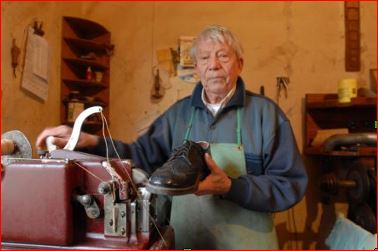Johnny Borysenko (Eulogy by Gary Poole) 18/03/14.
Good afternoon, or perhaps I should say “Dobri Deynan” because after all, we are here to celebrate the life of John Borysenko
In Western Ukraine, near the Polish boarder, lived the daughter of a wealthy land owner. Antonina, who had fallen in love with a Siberian Cossack Officer, called Max Borysenko.
Antonina and Max were married in 1918 and they built a house on 2 acres of her fathers land.
Their first child was John, born in the summer of 1919. They go on to have two other children, Peter and Maria.
After the Russian revolution, most of the family farming land is taken, and fearing persecution, Johnny’s mother burns the Cossack uniforms of his father, and buries the Cossack sword.
Max is taken to Siberia, but eventually returns home to work at the new Soviet flour mill.
Johnny attends the local Marcovichi and Locachi schools when weather conditions allow. During the winter, snow prevented them walking the 10km to school.
By age 16, the Boot making apprenticeship was started with a Jewish family in Locachi.
That is also where the fishing starts in the rivers of the region, and some of the stories start, many of you may be familiar with.
Finishing the trade as boot maker by 1938, Johnny starts working on road building, “byo shovel”. He recalled the story about some “bloody bastard pinch shovel”, my father wasn’t very happy, shovels were expensive. He told me to sleep with the new shovel.
By 1939 the Soviets have also built a large boot making factory in a nearby town. Johnny puts his name down, and is offered a job and house, once his national service with the Russian army is finished.
However, the Germans have decided to invade Russia as World War Two looms. Johnny never returns home to Marcovichi.
(The RSL will detail more about the active service within the Russian Army)
By 1944, he becomes POW, moving across Europe working on dams and railways for the Germans. He manages to keep in favour with guards by repairs to their boots.
The Allied forces liberate the POW in 1945 and Johnny decides its best to aim at working for the Allies, rather than risk being sent to Siberia by the Russian to work in the salt mines.
From 1945 to 1948 he drives trucks, delivering briquettes.
It during that period, he is free to travel in Europe in his time off.
During his time in Hamburg, he meets a German girl, Karla Brandt and the romance is on.
They married in 1949 and started the resettlement process.
By May 1950, they are approved for Australia. Departing from Naples Italy 2nd November 1950, aboard the SS Protea bound for Melbourne, where they arrive 9th of December 1950, with over 1000 other people.
Next stop for the Borysenko’s is the Bonegilla camp.
It’s a far cry from Europe, tin sheds in the middle of Victorian Summer.
One mate of Johnny’s was this big six foot six Russian Cossack; he wasn’t coping with the heat, “The poor bloke wanted to go home, said they have huge rats here”.
Johnny later realised he was referring to a ring tail possum.
Geelong and Ford factory is the next stop becoming a life long supporter of the “Geelong Cats”.
Buying land in 1953.
It is the time of football, friends and more fishing.
However a little fishing gets Johnny in trouble with the law, he recalls about this new surf rod he had bought. “I was fishing, but catching little ones, the officer say’s that they are undersize, I no understand, he take my new rod and say come to court. I go, and the judge say, how you plead, my English no good, he say why you catch the little ones, I say ‘cause couldn’t catch the big ones”.
Johnny is now taking some boot making as extra income, he joins the Boot Makers Union, and see’s ad for boot maker, travels to Lismore and meets with Chris Bennet and Mr Grimwade and the deal is done.
The Heriot street home is moved in and set up with assistance from Mr Grimwade.
As boot making work declines he gets a job as ganger with the Victorian Railways, based at Lismore, then Derrinallum. Working with local identities such as: Grogen, Stone, Bones, wild Bill, Des, Beau and Watty and many others. His time with the Railways, will again have many stories to tell.
Johhny retires from Railways in 1980, and also retires the FJ Holden he bought from Urquart Motors and buys the new blue Flyer, the Datsun wagon.
Off camping with Karla, lots of fun, fishing and little Johnny Walker.
Travelling all over including Queensland and taking advantage of many senior citizens trips.
In 1994 Karla passes away, and that took its toll on Johnny.
With the support of community here, he has continued to live at home.
Local children, neighbours, close friends and Nursing services have all allowed him to continue his remarkable life.
Johnny always enjoyed the social outings and visit to the corner store for a cool drink. His doctors remind him about responsible drinking.
“My Doc Maraagh say, only three Johnny Walker’s now, bloody hell, I ask Menzies, he say three as well…. I think it means I can have six…
So it's: Na zda-ró-vye, do svidaniya
